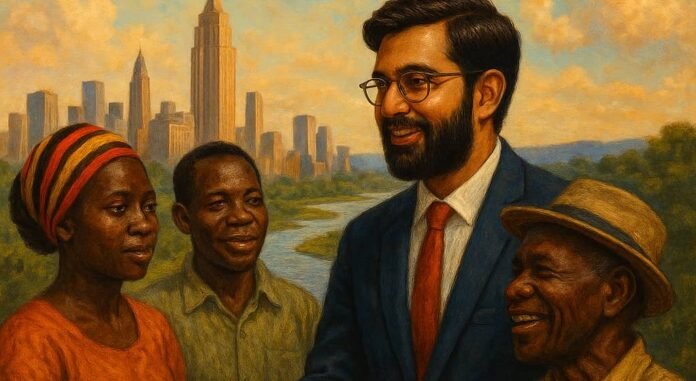When a Son of Uganda Knocks on the Mayor’s Door: A Discourse on Lessons from Zohran Mamdani’s Rise
By: Isaac Christopher Lubogo
The Drumbeat of History
When I first read that Zohran Mamdani, a child of Uganda, born of Mahmood Mamdani’s blood and heritage, had outwitted giants in the New York mayoral race, I felt the earth shift beneath my feet. It was as if the Nile itself had whispered across the Atlantic: “Do you see what is possible when courage meets conviction?”
In America, where politics is often a billionaire’s game, here was a young Ugandan-Indian socialist, standing tall, armed not with gold but with grit, not with dynasties but with the daring to dream. He walked into the lion’s den of Cuomo’s establishment politics and came out with the crown—not by chance, but by building his kingdom in the alleys of Astoria, among renters, bus drivers, childminders, and the forgotten.
The Gospel of Grassroots
Uganda must learn this hymn: the future does not lie in State House corridors alone, but in the boda boda stages, in the WhatsApp groups of restless youth, in the villages where maize dries in the sun while mothers count coins for school fees. Mamdani’s ascent was not orchestrated by billion-shilling tycoons but by the countless small voices who, when harmonized, shook the throne of privilege.
This is the gospel of grassroots: politics is not given, it is claimed, one rented room, one commuter’s struggle, one hungry child at a time. In Uganda, where the youth are dismissed as “jobless idlers,” Mamdani teaches that the so-called idlers are in fact the architects of tomorrow.
The Power of Tangible Promises
Consider his platform: free public transit, rent freezes, universal childcare. These were not slogans but bread on the table, light in the darkness, shelter over heads. Compare with our slogans back home—“prosperity for all,” “steady progress,” “wealth creation”—phrases floating in the clouds, too abstract for the villager in Namwendwa or the mechanic in Kireka.
The lesson is sharp: Ugandan politics must descend from the mountaintop of rhetoric and taste the dust of people’s reality. Leadership must become less about promising heaven and more about making earth habitable.
Of Systems and the Ranked Choice of Life
New York’s ranked-choice voting forced candidates to appeal beyond their tribes, beyond their first-choice disciples, to a broader tent. Contrast that with Uganda’s winner-takes-all politics—where the victor claims everything and the loser becomes an enemy of the state. This monopoly is the root of our endless political acrimony.
Imagine, then, a Uganda where elections reward coalition building, consensus, and compromise rather than bloodshed and broken friendships. Mamdani’s victory whispers: democracy can be structured to compel inclusivity.
The Theatre of Attack and Response
They mocked him, called him “communist,” scorned his rent-stabilized life. But Mamdani, like the phoenix, rose from the ashes of ridicule and redefined the insult as strength. He showed that transparency disarms lies, and boldness converts criticism into campaign fuel.
Ugandan politicians, accustomed to hiding wealth and dodging questions, must learn: the people forgive poverty and imperfection; what they cannot forgive is hypocrisy cloaked in arrogance.
The Diaspora’s Forgotten Hand
Finally, Mamdani’s journey is the ultimate mirror to Uganda’s estranged children abroad. We call them “bazukkulu of dollars” only when we need remittances. Yet here is proof that the diaspora is not merely a wallet but a reservoir of leadership, courage, and ideas. Uganda must stop shutting its doors to returnees who dare to dream politically. The Mamdani story proclaims: exile can still father mayors; diaspora blood still flows with civic fire.
A Closing Reflection
So what is the Lubogo verdict?
Mamdani’s march to the mayoral seat is not just New York’s story—it is a Ugandan parable. It tells us that grassroots mobilization can dethrone kings, that real promises beat empty rhetoric, that systems matter, that criticism can be weaponized into fuel, and that diaspora sons and daughters carry torches we too often ignore.
In him, I hear the echo of Nyerere: “Without unity, there is no future for Africa.” In him, I see the irony of Museveni’s early 1986 dream—of power returning to the people—now being fulfilled not in Kampala but in Queens. And in him, I see the challenge to us all: Uganda’s greatness will not come from the recycled slogans of the past but from the grassroots defiance of the present.








